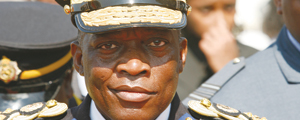
THE MDC-T is concerned that securocracts are likely to block the ascension of Prime Minister Morgan Tsvangirai if he wins the next election and failure to implement security sector reforms may trigger a constitutional crisis after the elections, a new report by the International Crisis Group (ICG) says. Report by Njabulo Ncube
In its latest report released yesterday, titled Storm Clouds in Zimbabwe: Scenarios Ahead of the Elections, the Brussels-based political think-tank said unless Sadc is able to push for reforms, particularly in the security sector, the country will have another disputed election.
“The MDC-T and others are concerned the security sector will prevent a transfer of power should Zanu PF lose,” reads the report.
“Over the last 18 months, several senior Zanu PF and security officials have made statements about the military rejecting or having difficulty in accepting election results, and warning of a ‘bloodbath’ should Tsvangirai win.”
In recent days, security chiefs have heightened their verbal onslaught on Tsvangirai, with Zimbabwe Defence Forces Commander General Constantine Chiwenga referring to the Premier as a “psychiatric” case.
Police Commissioner-General Augustine Chihuri has also said he would not meet Tsvangirai, insinuating that he was a malcontent.
The report by the Brussels-based group says a significant, but limited, number of top military officials had been implicated in political violence and failure by President Robert Mugabe to censure them could mean that the soldiers had political approval.
“Mugabe did not disavow any of these, despite his command responsibility and the blatant violation of a GPA (Global Political Agreement) commitment to charting a new political direction for the country,” ICG says.
- Chamisa under fire over US$120K donation
- Mavhunga puts DeMbare into Chibuku quarterfinals
- Pension funds bet on Cabora Bassa oilfields
- Councils defy govt fire tender directive
Keep Reading
The report also noted the failure of the National Security Council to meet regularly, saying the body — which was created to review national policies on security, defence, law and order and make recommendations — could have helped narrow the gulf between the MDCs and the securocrats.
Zanu PF has for the past four years resisted security sector reforms, as the party says this could be used to implement regime change.
Since mid-2012, the report notes, Sadc facilitator and South African President Jacob Zuma has stressed the need for security sector reform, but ensuring these calls translate into action remains a challenge.
ICG called upon Sadc to ensure that reforms were implemented soon and the Joint Monitoring and Implementation Committee (Jomic) was strengthened if Zimbabwe had any hope of holding a credible election.
ICG noted that Zanu PF and the two formations of the MDC were unlikely to resolve the election roadmap deadlock and advance other reforms on their own, with disagreements escalating as the election drew near.
“To help create a credible election process and environment, Sadc needs to increase its monitoring capacity, as well as its ability to respond in a timely manner to remedy any concerns,” reads part of the report released in Johannesburg, South Africa, yesterday.
The think-thank proposed that Sadc, the guarantor of the GPA, together with the African Union, set up an in-country liaison office, as in Madagascar, and be more assertive on the outstanding Jomic deployments.
Zanu PF is understood to be flatly against the deployment of foreign officials to Jomic, arguing that it was tantamount to foreign interference in Zimbabwe’s affairs. Last month, Zanu PF officials refused to allow the Sadc facilitation team to sit through a Jomic meeting.
But ICG said the regional bloc could address issues bedevilling the coalition government by setting up an in-country liaison office.
It added: “Beyond that, it also needs to define its ‘red lines’ and demand compliance to its democratic principles and guidelines.
“Despite inflammatory statements by some politicians, ample evidence shows that all GPA signatories regard Sadc’s involvement in Zimbabwe as crucial to political stability and legitimacy of the election result.
“Progress is possible, but only if fundamental contradictions between the parties’ interpretation of what is now required are resolved. Whereas the MDC formations have called for the full resolution of outstanding election roadmap issues even after adoption of a new constitution, Zanu PF says the new constitution should supercede the roadmap.
“Without agreement on such important issues, Zimbabwe is not ready for elections.” The report says there is no guarantee that deferring the election further will lead to reforms.
ICG noted that the MDC-T and others were concerned the security sector will prevent a transfer of power should Zanu PF lose.







